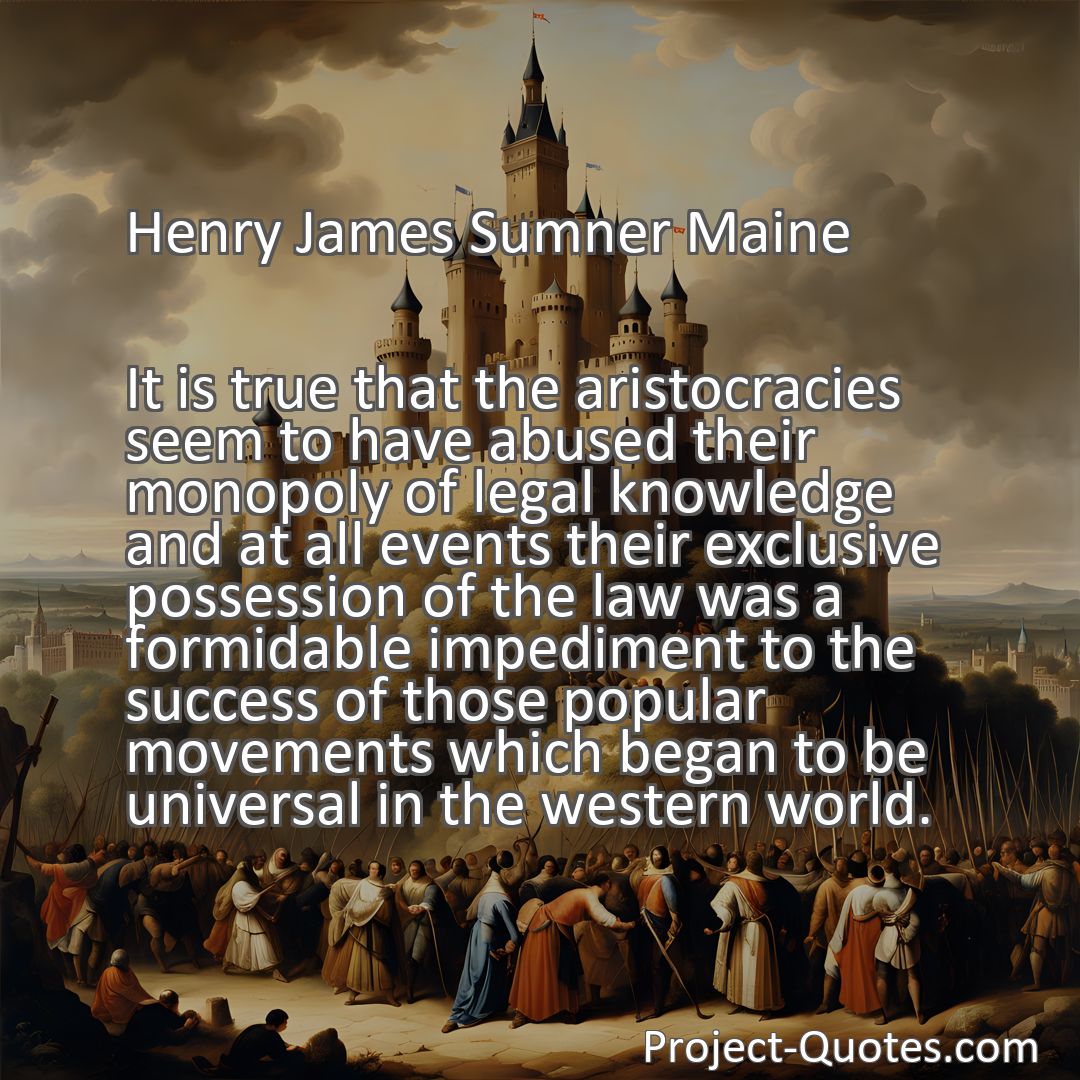It is true that the aristocracies seem to have abused their monopoly of legal knowledge and at all events their exclusive possession of the law was a formidable impediment to the success of those popular movements which began to be universal in the western world.
Henry James Sumner Maine
Renowned author Henry James Sumner Maine sheds light on the power and pitfalls of legal knowledge in the Western world. He explores how the aristocracy historically used its exclusive access to legal knowledge to manipulate laws, hinder popular movements, and maintain their power. This essay examines historical examples, such as the French Revolution, to emphasize the importance of accessible legal knowledge for societal progress.
Table of Contents
- 1 It is true that the aristocracies seem to have abused their monopoly of legal knowledge and at all events their exclusive possession of the law was a formidable impediment to the success of those popular movements which began to be universal in the western world.
- 2 Henry James Sumner Maine
- 3 Meaning of Quote – It is true that the aristocracies seem to have abused their monopoly of legal knowledge and at all events their exclusive possession of the law was a formidable impediment to the success of those popular movements which began to be universal in the western world.
- 4 Freely Shareable Quote Image
- 5 Related
Meaning of Quote – It is true that the aristocracies seem to have abused their monopoly of legal knowledge and at all events their exclusive possession of the law was a formidable impediment to the success of those popular movements which began to be universal in the western world.
The Power and Pitfalls of Legal Knowledge in the Western World: Lessons from History
Introduction :
In his thought-provoking statement, the renowned author Henry James Sumner Maine sheds light on the complex relationship between legal knowledge and social movements in the history of the Western world. Maine argues that the aristocracies historically held a monopoly on legal knowledge, which not only enabled them to abuse their power but also hindered the success of popular movements. This essay will delve deeper into this idea, exploring historical examples and drawing valuable lessons about the importance of accessible legal knowledge for societal progress.
Main Body:
1. Historical Context :
To fully grasp the significance of Maine’s quote, it is essential to delve into the historical context that influenced the development of legal knowledge in the Western world. During feudal times, the aristocracy held a commanding position in society, reinforced by their exclusive access to knowledge, including legal matters. This privilege bestowed upon them immense power, often enabling them to manipulate laws to their advantage and suppress popular uprisings seeking to challenge their rule.
2. The Effects of Aristocratic Monopoly :
The aristocracy’s monopoly of legal knowledge served as a formidable impediment to widespread societal change. By withholding the intricacies of law from the masses, they perpetuated a system where justice became a tool to maintain their own interests, rather than ensuring equality for all. Consequently, popular movements that began to emerge faced significant challenges in effectively demanding social, economic, and political reforms. The power imbalance inherent in the exclusive possession of legal knowledge further exacerbated the divide between the ruling class and the common people.
3. The French Revolution: A Turning Point :
One of the most transformative periods in European history, the French Revolution, exemplifies the struggle between aristocratic dominance and the demand for accessible legal knowledge. The revolutionaries’ resounding cry for “Liberty, Equality, Fraternity” echoed the need for justice and dismantling the old aristocratic legal order. The French Revolution became a significant turning point as it exposed the corrupt nature of the aristocracy’s control over the law, ultimately leading to radical transformations in the world’s power structures.
4. Democratizing Legal Knowledge :
As the world progressed, enlightenment thinkers and reformers recognized the urgent need to democratize legal knowledge. Emerging liberal ideologies stressed the importance of the rule of law, equal rights, and the removal of obstacles hindering social progress. These ideologies paved the way for educational reforms that aimed to provide individuals from all walks of life with a fundamental understanding of the law, empowering them to actively participate in shaping their societies.
5. Contemporary Relevance: Empowering the Masses :
In today’s world, Maine’s words still carry weight, reminding us of the continuing need to make legal knowledge accessible to all. Ensuring that the law is not a tool exclusively reserved for the privileged few is crucial in promoting social justice, preserving democracy, and fostering societal well-being. Efforts to promote legal literacy, providing accessible resources and opportunities for legal education, empower individuals to navigate complex legal systems, advocate for their rights, and drive meaningful change.
Conclusion :
Henry James Sumner Maine’s quote calls attention to the historical abuse of legal knowledge by aristocracies while exploring its adverse impact on popular movements seeking societal change. By reflecting on the lessons from history, we realize the necessity of making legal knowledge inclusive and accessible to all, fostering a society where justice is not a privilege but a universal right. Embracing this ethos empowers individuals in their pursuit of social progress and ensures a more equitable future for all.
I hope this quote inspired image brings you hope and peace. Share it with someone who needs it today!


